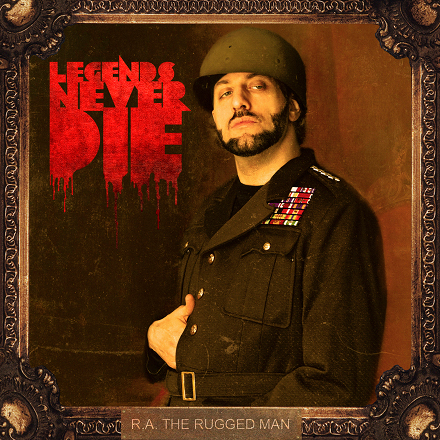Indie Spotlight: R.A. The Rugged Man
Dec 26 2013
“Sick” would be a good word to describe R.A. the Rugged Man: sick with the lyrics, sick with the flow and maybe even just a little sick in the head.
Never one to bite his tongue or give two f@#!s about what you think, R.A. has carved a niche for himself as one of hip hop’s heaviest spitters and, in a time of flash-in-the-pan rappers, a true bastion for lyrics and substance in the music. Unable to be caged, he was a label’s worse nightmare (read below) and after failed stints in the major label system has gone the independent route through a deal with indie label Nature Sounds. Now his art answers to nobody to himself. The result of this? His first studio album in nine years with Legends Never Die, featuring Tech N9ne and Krizz Kaliko on the song and music video “Holla-Loo-Yuh”.
We were able to chop it up with the Brooklyn-bred emcee to get his take on hip hop: the business, culture and music. R.A. didn’t mince any words as he told us about where the music has been, where it is now and where it’s going.
If I were going to play your music to a friend of mine that would be quintessential songs from your catalog, what should I play them?
Well you can play them the first five songs from my new album. Then you would be stuck on the next five songs, stuck on the next five, then you’d want to listen to the rest of my catalog.
I know this is a question you’ve probably answered many times but what made you want to get into rap in the first place?
Oh man, the most generic questions in the history of interviews.
It is. Better ones are on the horizon, but this interview was given on short notice and I couldn’t find the answer beforehand.
I thought this was Strange Music and we were going to do something interesting and – nah I’m just fucking with you man (laughs). But yeah, all the kids in the neighborhood were rhyming and it was competitive and we vibed everyday and tried to get better. Well I ended up getting better than most of the people around the way and then got to be the best in the neighborhood and then wanted to go pro with it. I guess I started rhyming at 11 or 12 and went pro around 15 and got all my record deals at 17.
So for you it was like “All the kids are doing it, so I’ll fuck with it.”
No, not all the kids was doing it. It was kids in the neighborhood doing it. There was a kid named Bob doing it and a Puerto Rican that was rhyming bi-lingual. There wasn’t a white kid in the area that was rhyming. A lot of the kids would look down to you for that. It was weird.
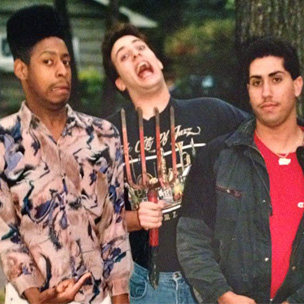
What was your process for developing that talent?
It came naturally to me. I don’t know why. For some reason I just had to get better than all the kids. I don’t know how I did it but it just happened.
What did hip hop mean to you when you first started listening to it? Why did you gravitate towards it so much?
I don’t know why (sigh). I have an obsessive personality to do things. I go a little overboard with everything if I get obsessed with it. If I get obsessed with boxing I get obsessed with. If I get obsessed with rapping I get obsessed. I kind of go a little bit deep into everything. Once I started liking it I ended up loving it and then for some goddamn stupid fucking reason I committed my entire life to it and that’s my life.
At a young age you turned down a record deal. You said you had a lawyer that was pissed at you for it and like “What are you doing?!” because you were so young and he thought you were stupid to turn it down. Then you actually had labels engaged in a bidding war for your services until you landed a pretty big contract – 1.8 million if I’m not mistaken. Why do you think you were worth the bidding war to them? What do you think they saw in you that made them so competitive?
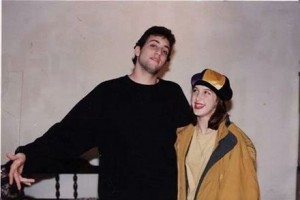 I was the best – that’s what they saw in me. In the early 90s they didn’t see nobody like me that could rhyme like that, so that’s why they offered me millions. Also at one point, 1.8 million dollars, a lot of people think is that what they do is put the whole deal together, so it’s not literally 1.8 million dollars the minute you sign. It’s like a six album deal so it was really $340,000 per album. You still have to record your album and all of that stuff and you have to record six albums for them. So it’s 1.8 million but it just sounds bigger than it is, but at that time, in the early 90s, it was one of the bigger deals out of everybody – all my peers. It was definitely one of the biggest deals at the time.
I was the best – that’s what they saw in me. In the early 90s they didn’t see nobody like me that could rhyme like that, so that’s why they offered me millions. Also at one point, 1.8 million dollars, a lot of people think is that what they do is put the whole deal together, so it’s not literally 1.8 million dollars the minute you sign. It’s like a six album deal so it was really $340,000 per album. You still have to record your album and all of that stuff and you have to record six albums for them. So it’s 1.8 million but it just sounds bigger than it is, but at that time, in the early 90s, it was one of the bigger deals out of everybody – all my peers. It was definitely one of the biggest deals at the time.
At the time we were just leaving the golden era where you were celebrated for your skill and your craft. Rakim, KRS-ONE, Public Enemy, they were all the greatest rappers on the planet and those were the ones who were selling records so come the early 90s, yeah you had some corny shit come out, but the legitimate skilled emcees were still capable of selling tons of records and they would actually market skill back then sometimes. So they saw a skilled emcee with the right complexion and they wanted to throw some money at the boy, you know?
That’s crazy to me and I guess that’s the reason I was so confused as to why they threw out so much money at you, because these days skill isn’t what’s marketed.
That does sound crazy right? That they actually signed people for talent. That’s different now (laughs). It sounds absurd, right? I mean they don’t do that. You could find 50 super emcees that could destroy Jay Z, that could destroy Em, that could destroy Kanye, that could destroy all these fucking guys that are getting all the acclaim, but it’s not about that. They’re not going to say “Hmm, let me give Elzhi ten million dollars because he can outrhyme Jay Z.” That’s not going to happen.

That’s really interesting that they wanted you because you were a great rapper.
That’s what it was. It was the 90s. That’s why they call it The Golden Era. The 80s is when the golden era peaked but in the 90s that’s what they were doing. Look at how much money went into Canibus at his peak in ’98. This was like five, six, seven years after me even. They were still signing like – “Oh shit, skill!” They signed Big Pun. “Oh shit! Skill! Let’s sign for skill!” There were still gimmick rappers. They would take “Oh this emcee sounds like so and so. Let’s sign him too,” but there was still “Wow, I think I’m going to sign the best rapper alive!” And sign these rappers that were actually technicians in the ’90s which really just doesn’t happen anymore. I mean they’ll sign a technician, but they won’t sign the greatest technician. They don’t care about that. That’s why when you listen to these new records that are coming out, from the most acclaimed artists, and what the records are, they aren’t even hip hop albums anymore. They’re pop albums. They’re like Christina Aguilera albums with verses on them. That’s what they sound like but with actual verses of rappers rapping but with 15 pop songs and verses cut into pop songs. It’s not hip hop anymore.
Even independent labels don’t sign for talent, what independent labels sign for is who has the most Facebook likes, who has the most YouTube views, who sells the most concerts on their own without the label being a part of it. Even indie labels that are supposed to be about art and hip hop don’t care about art and hip hop, they care about what can make them the most money with them doing the least amount of work. That’s what indie labels do even, so the whole game is twisted. They can love your music and then what they’ll do is go “Hmm…let me look at the numbers, how many people showed up for the show in his town, let me look at his YouTube views, let me look at Facebook likes. Let me look at Twitter followers.” And that’s how they decide who they should fuck with on Indie labels now and majors too.
What’s crazy to me is that execs once had a mindset to where they thought that talent alone was a sound investment. At the end of the day they still wanted to make money, but they were banking on talent to do that for them. It still astounds me that Wu Tang blew up like they did because while the music is unmistakably dope, it’s not exactly poppy.
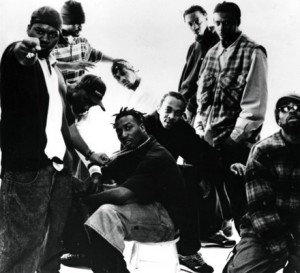
Well you’re forgetting that around the time that they came out there was also artists like Biggie and Nas and Wu-Tang and that whole era was just emcees being emcees and spitting bars. Yeah you had Dr. Dre on the west coast doing beautifully produced music but you had all these underground lyrical cats too. Even the whole Duckdown thing, Buckshot and them were selling gold records off of doing little basement, real hip hop type joints. That was the era we were in at that time.
What the problem is today is that everybody listens to hip hop and nobody knows anything about the culture so some mediocre rappers will grab hundreds of thousands of fans all over the globe and they’ll be garbage rappers because all these people who have no soul, have no rhythm, know nothing about hip hop or the culture or anything, they gravitate towards this music they know nothing about, so it could be some mediocre shit and everyone will be like “Wow this is some great rap music.” Because they don’t know about Rakim, they don’t know about that. So who gives a fuck about skill when these guys are trying to make money? They go “Hmm, who can we sell to a bunch of fucking drunk, 15 year old high school kids that know nothing about the craft? We can’t sell them intelligence, we can’t sell them Rakim, we have to sell them this belligerent buffoonary.”
It’s funny, and I don’t want to name names, but there’s a lot of artists who have come out in the past five years or so who actually openly admit that they’ve been rapping for like, six months or something.
Well they all lie about that too. They all say that. That’s the gimmick. Even B.I.G. used to say that. He used to go “Oh I started rhyming three years ago” and you were like “No you weren’t!” It’s funny because he was rapping when he was 12, but I guess what they mean by that is that they started rapping serious or someone put them in the studio. Even Game when he came out, didn’t he say he’d been rapping for two years? I don’t know. They all say that shit, but I don’t know how real that is, but at this state in the game, it doesn’t matter anyway. If you’re thinking pop music it doesn’t matter because you don’t have to rap, so who cares if they were rapping for three months or thirty years?
Now going back to your signing, after that you’ve had at least a few albums that haven’t actually come out. Can you give me a short run down as to why that was?
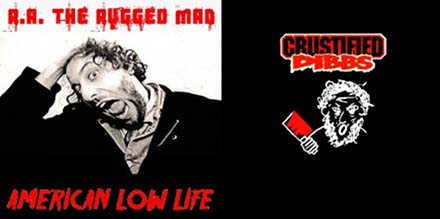
Because I was in a lot of trouble (laughs): sexual harrassment charges, lawsuits, riots, death threats…everything you could think of in that era was conducted under my situation. It was a real ill era. Corporations were scared of me. I didn’t want to fuck with the corporations. I have recorded albums that were brilliant albums, I believe. The fans got to hear bootlegged shitty versions of them. Sometimes when you rebel too hard you don’t get to play ball with the system because you know the system is against you so sometimes cooperating isn’t always the answer.
Where are these albums now? Will we ever be able to hear them in proper form?
I’m not really sure. I don’t know. It’s the past. Fans got to hear poor quality versions of them and that hurt. That hurt me a lot and that is what it is. You work hard to make these brilliant albums, or when you try to make them brilliant albums, I’m not saying I’m brilliant, but I’m saying I try to make my albums brilliant. I work hard to try and make a brilliant album and you spend hours and hours and hours and weeks mixing them, working to make the snare pop correct and this and that and when it comes out it’s a god damned bootleg and it sounds like warm shit because it’s a copy of a copy of a copy. That’s what they get to hear.
It’s interesting because you’re very, very well-known in the culture, but upon doing research you only have two officially released albums.
There’s more than official. Regardless of what the corporations want to do I still sing those particular songs all over the world and the fans know them. I recorded one for Priority called American Lowlife. I put out Legendary Classics which had ten new songs an eight classic records. You know, I’ve got five albums in the catalog.
Yeah and just because they’re not on Amazon or whatever doesn’t mean they don’t exist.
Yeah, like if an album goes out of print does that mean that it doesn’t exist, that you didn’t put your heart and soul into something?
What do you think are the biggest drawbacks of being signed to a major label?
Well here’s the thing, I don’t work very well with non-creative people and I’m not a political person. So if you’re honest with the people you work with that have power, it hurts your career politically. You tell someone that had to be an investor of the corporation to their face – like I would literally throw them out. They would come to my session and I would “Hey, you get the fuck out! You ain’t coming into my session.” They’d come in and sit down and try to tell you how to do this or what record you should do for this and how to do that. I’m like “Naw, this is my creative process. Your job is to market what I do, not try to mold my shit because you’re non-musical.”
Like I said on the new album “Independent artists with a hundred percent creative freedom, that’s what’s beautiful about this era.” I can do whatever I want and when you hear my album it’s one hundred percent my album in its purest form, the way it needs to be heard and what I want to do. That’s the only way I want to make music because I don’t think music is supposed to be in a fucking test tube. “Try this! Try that! Try this!” by like 15 corporate scientists who have financial ideas. Then the music isn’t organic. It’s supposed to feel good and feel right out of the artist.
In your experience with major labels, what motivates a lot of the shot callers? Obviously they want to make money but what goes into their thought process in predicting what exactly is going to make money?
Well “What’s making money right now?” That’s what goes in their thought process. “What producer’s hot?” What singer can they put on the chorus that’s hot. “What’s selling at the moment?” “What looks like it could be marketed to the people?” That’s what they look at: “Okay so what’s the top ten records that are hot right now? What do we have to do to get those exact records?” They just look at what’s going on. That’s why all music goes through these trendy era where it will follow certain trends for a year or eight months or six months or two years or three years and then move onto its next phase and labels will push another trend.
I remember reading this XXL article that said that ’97 was the best year ever for hip hop, and I believe their justification was the commercial power that hip hop had started to gain around that time. Do you think that the commercial power that hip hop has garnered is a good thing or a bad thing? On one hand you have a culture making its voice heard to the world which is awesome, but on the other you have an art form acting a slave to the dollar.
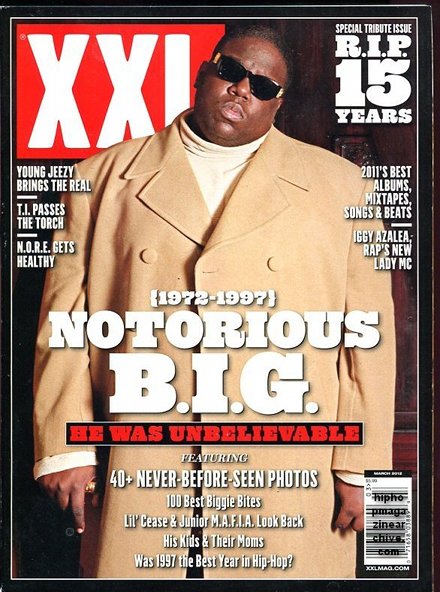
I think whoever wrote that article is a fucking ignorant idiot that doesn’t know what the fuck they’re talking about. I don’t know who wrote that and the writers at those magazines are clueless and don’t have any education on the culture. They just go “Oh! This year!” They don’t know what the fuck they’re talking about.
The more lucrative any art becomes the more watered down the culture becomes, whether it’s from painting, to dancing, to cinema: whatever the fuck it is, it becomes a watered down culture because you’re going to have all these culture vultures coming in with their sticks and poking at it, trying to get involved, where they wouldn’t of been involved if there wasn’t any financial gain from it. Of course it’s going to get watered down. Take any emcees from ’97, ’98, or whenever the fuck year they’re saying it is, and compare them to the greats of a golden era of an ’88. You know what I mean? Before all the money totally took over the game. Look at the golden era and look at how pure and uncut the culture was.
In what kind of state do you think the industry is in right now because we have power shifting to independent entities. Do you think that that’s a trend that will continue and is that a reason to be somewhat hopeful?
Well it’s going to go to independent entities because the labels are going down, they’re getting hurt up and the internet is taking over. Look how huge Kendrick Lamar is, right? One of the most famous rappers in the game, right? The guy sold like a million copies only. And that’s considered huge. If somebody had Kendrick spinning ten years ago he would’ve sold ten million copies. It’s a different era. They’re selling a tenth of what the fuck they sell so labels are hurting.
There’s not a lot of money for labels so the independent game is going to get bigger and bigger but then what’s going to happen is when the independent artists start making all this money, then that’s going to get tainted too, which it already has because then there’s going to be corporations to come in and help finance the independent artists.
If you look at all the big independent artists today, they’re like “Oh, we started from scratch!” but it’s the same thing: they had powerhouse lawyers, powerhouse publicists, powerhouse management companies, booking agents that manage touring. All these people that come in and a lot of them come in with different money to finance a lot of that stuff. These independent artists are making 300, 400 thousand dollar videos looking type shit so the independent hustle is even being tainted by corporate cash.
You talked about the downfall of record labels and they are on a decline, do you think any part of that is due to karmic justice or do you think it’s just the way things are evolving?
Nah, I don’t think it’s due to karma because they’ve been robbing people in the music business since the music business started and the people who started are dead. Those fuckers who robbed all the artists back in the day and left them broke are all dead. They’ve been dead for years and years and years and years. Decades of criminals have died so the fact that this generation is hurting from it, it’s not karma on the whole industry. However in my head I pretend it is: “Haha! I got revenge! Fuck ’em all!” but in reality I think it’s just the changing of the times. There’s certain hustles you have and sometimes those hustles can’t be the same no more.
You’ve been doing your thing independently for a minute now. How would you compare and contrast this to being in a major label situation?
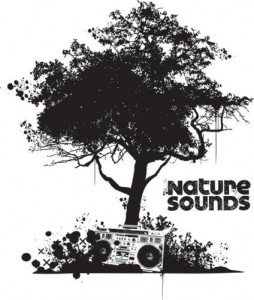 Well it’s stress free. I don’t have anyone to answer to so it’s stress free. See, when you’re on a major you can make a classic, classic, classic record and then you play it for the record label and they’re looking for certain commercial ways to do certain things with it that might not fit what they have in their little ignorant brain and they go “Oh, can we try this record?” Out of your whole album they’ll pick the worst songs you’ve ever made to be the ones they want to market, and they’re songs you don’t even want on your album. They’ll look at classic work and be like “That’s okay.” They’re not even going to push it. When you’re independent you don’t have to worry about that. When you know which records that are great, those are the great records and those are the records that are going to work, that you’re going to let your fans hear and give out to the people.
Well it’s stress free. I don’t have anyone to answer to so it’s stress free. See, when you’re on a major you can make a classic, classic, classic record and then you play it for the record label and they’re looking for certain commercial ways to do certain things with it that might not fit what they have in their little ignorant brain and they go “Oh, can we try this record?” Out of your whole album they’ll pick the worst songs you’ve ever made to be the ones they want to market, and they’re songs you don’t even want on your album. They’ll look at classic work and be like “That’s okay.” They’re not even going to push it. When you’re independent you don’t have to worry about that. When you know which records that are great, those are the great records and those are the records that are going to work, that you’re going to let your fans hear and give out to the people.
Speaking of current times, here’s another cliché question for you, but who are some emerging acts as of late that have caught your attention that you’re enjoying right now?
You said you interviewed Reks recently, right?
Yes.
I’m a fan of that kid Reks man. I like his shit. Locksmith from the West Coast. He hit me up like “Yo! Let’s do this joint!” and I’d seen him perform live at a Skee. Skee had a little thing out in New York. Locksmith is lyrical. He came through “Boom boom!” spitting lyrics. I like his stuff. There’s a lot of rappers I like, a lot of up and coming kids where you’d say “Wow, this kid could be the future.” We’ll see what happens.
Do you do a pretty good job at keeping your eye out on what’s going on and who’s doing what? Do you seek it out or does it come to you?
Well now we’re all online, you know? Usually you hear a little buzz about somebody through your timeline or this or that. You’re almost spoonfed to new stuff that’s coming out and once in awhile I’ll go “Yo let me check out what they’re talking about” and I’ll listen to some of it and go “Wow, it’s terrible. The fucking society’s retarded” but sometimes I’ll click on it and go “Wow this kid is great. Oh my God!”
I get a lot of stuff from recommendations online or just rapping with people and they say “Hey yo, have you ever heard of so and so?” I go “No, he’s dope?” and they break down a little something that they might’ve done. My man Nino Bless did this record I like a lot called “Rhyme Of The Year”. He’s brutal – brutal lyricist, and he spit a rhyme on “Rhyme Of The Year” where he basically said “if any of these dudes spit this hard – any of these guys that are the top tier commercial rappers – everybody would be on their dicks for that.”
That brings up the double edged sword of technology, not only is music easier to get, but also easier to make. You have a lot of people who are scattered about who aren’t very good, but you also have a bunch that you wouldn’t of heard of otherwise if it was the old school studio system. Do you think in terms of skills and what’s available has technology made it better or worse?
Well it’s the same exact thing as filmmaking. It’s great and it’s horrible at the same time, because you discover all these great young filmmakers. Everyone can be a filmmaker because of digital technology so you find all these great, great filmmakers and at the same time you find the world’s worst filmmakers and the world’s worst music videos ever directed and the world’s worst talent, but at the same time you find great great talent that you wouldn’t of discovered if they didn’t have the internet.
It’s the same thing with hip hop music. There’s unbelievable talent that you’ll find online that you would have never ever ever found if it wasn’t for the internet – because they have no access to getting their stuff out – but then you’re also swamped with the world’s worst rappers that have ever lived. You have to hear some of their shit…so there’s two sides to it.
Is there a trend in hip hop right now that you wish would change or go away?
Yeah there’s a ton of them. There’s a million of them. I wish that the rappers that have center stage, like the big name artists that have a lot of power, I wish they would make classic hip hop albums, because everyone is watching them and everyone will buy their music. They don’t have to make this little girly-sounding pop albums with absent verses on them. I wish they would go back to the drawing board and just make beautiful, untamed hip hop classics. I almost feel like hitting up some of these mainstream rappers and saying “Hey, get in touch my boy Mr. Green, let him make a beat for you.”
Are there any big or mainstream releases that you did enjoy this year?
They were playing a couple of mixtapes on the tour. They were playing a mixtape by a kid named King Los that’s signed to P. Diddy. I guess you don’t much commercial-er than P Diddy, and I liked some of the rhymes on King Los’s shit. There was some new artist that they signed to Def Jam called Logic that when I heard it I was like “Oh, that kid can rhyme!” Those are some cats that some of the mainstream is trying to promote and they were rhyming, you know?
If you could give one piece of advice to anyone who’s really trying to make a career out of this, because God knows there’s a ton of people who are, what would you tell them?
It depends on what kind of success they’re looking for. If they’re looking for artistic success the thing to do is study the craft. Study the history. The more you know about the history the better you can be in the future because the greats have already laid down the foundation. If you’re trying to reinvent the wheel, you’re never going to be as good as these guys, you’re going to be doing things that they already did 20 years ago, 30 years ago, 25 years ago. You’ll think you did something innovative and new, but a hundred emcees already did it, you know what I mean? So you can learn a lot from the history and then build off of that and get better than them and work your hardest. Just stay confident in your craft and know you got to get better when you got to get better and just build, build it like blocks. Just build.
Is there anything you want to say as we wrap this up?
Yeah I got the new video out with me and Vinnie Paz and Sadat X, it’s called “Sam Peckinpah”. I think the fans will love that shit. I’ve got the album in stores right now, Legends Never Die. It’s just classic hip hop at its finest, purest form. Turn off all the bullshit records that they’re trying to make you buy and the magazines that they try to get you to buy all these cornball albums, get the god damned classic of 2013, and ’14, and ’15. It’ll be a classic for many years to come.
Going off of that, will you ever be a mixtape rapper?
No, never.
Do you think it’s better to just put a lot into making one classic album that you and the fans can eat off of for years to come?
I’m from a different era man. In my era, when Big Daddy Kane came out with a song, it was a big deal. When he came out with an album it was a huge, huge deal, and you listened to that album and you studied it and you played it back and forth and forth and back. 20 years later you pick it up and you’re still playing it and listening to it back and forth and back and forth.
What I want to do is make music that when you get an RA The Rugged Man album it’s special. It’s like “Wow, RA got a new album. Oh shit!” And you listen to it back and forth and back and forth. I’m hoping I’m making sure that I’m still performing those songs in twenty and they’re not forgotten, so I’m promoting my music off my album because I want to perform it for the rest of my career, that’s why when I’m in Europe now I’m performing songs that I made twenty years ago and I expect to still be performing those songs twenty years from now.
